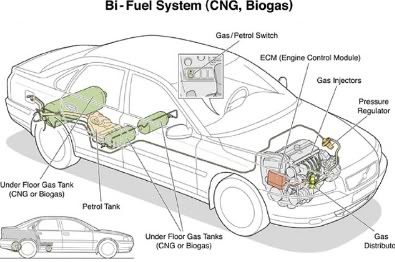In Pakistan, buffalo dung is turned into fuel, fertilizer, electricity and jobs
Earlier we reported on Pakistans successful and mildly spectacular policy of abandoning oil and replacing it by compressed natural gas (CNG). The country's aggressive policy so far resulted in 1 million gasoline cars being converted into CNG vehicles. Back then, we noted that these CNG vehicles could also be powered by biogas, a more interesting option for the future.
A pilot project in the city of Karachi is exactly following that route. There, the PakTribune reports, a multi-purpose project called 'Waste-to-Energy and Fertiliser’ will be set up at the Landhi Cattle Colony by the city government in collaboration with the New Zealand government at an estimated cost of US$ 135 million.

Bifuel cars work both on ordinary gasoline as well as on compressed natural gas or compressed biogas.
According to City mayor Syed Mustafa Kamal, the pilot project being set up with a financial grant of New Zealand Agency for International Development will be made operational in six months. It uses the biomass waste generated by the 7,000 buffaloes of a cattle colony that used to pollute the local environment. The plant will be producing the following energy sources, products and jobs:
Cars running on buffalo dung, it's something one has to get used to, but it makes great and green sense. It is this kind of projects that allow us to foresee a genuinly distributed and locally controlled energy infrastructure, including that for cars. And once again, the developing world, with its lack of existing petroleum infrastructures, has the opportunity to go beyond the West's petro-tradition and to leapfrog towards a bright green future.
[entry ends here.]
 ethanol :: biodiesel :: biobutanol :: biomass :: bioenergy :: biofuels :: energy :: sustainability :: Africa ::
ethanol :: biodiesel :: biobutanol :: biomass :: bioenergy :: biofuels :: energy :: sustainability :: Africa ::
A pilot project in the city of Karachi is exactly following that route. There, the PakTribune reports, a multi-purpose project called 'Waste-to-Energy and Fertiliser’ will be set up at the Landhi Cattle Colony by the city government in collaboration with the New Zealand government at an estimated cost of US$ 135 million.

Bifuel cars work both on ordinary gasoline as well as on compressed natural gas or compressed biogas.
According to City mayor Syed Mustafa Kamal, the pilot project being set up with a financial grant of New Zealand Agency for International Development will be made operational in six months. It uses the biomass waste generated by the 7,000 buffaloes of a cattle colony that used to pollute the local environment. The plant will be producing the following energy sources, products and jobs:
- biogas (methane), part of which will be sold as a vehicle fuel for CNG cars
- biogas converted to electricity, worth up to 30 mega-watts
- around 15 tons enriched organic fertiliser per day
- thousands of cubic metres of water which is, at present, being used for washing away dung at the cattle colony, will be saved and used for irrigation and watering purpose
- the project will help generate 3,000 jobs
Cars running on buffalo dung, it's something one has to get used to, but it makes great and green sense. It is this kind of projects that allow us to foresee a genuinly distributed and locally controlled energy infrastructure, including that for cars. And once again, the developing world, with its lack of existing petroleum infrastructures, has the opportunity to go beyond the West's petro-tradition and to leapfrog towards a bright green future.
[entry ends here.]
 ethanol :: biodiesel :: biobutanol :: biomass :: bioenergy :: biofuels :: energy :: sustainability :: Africa ::
ethanol :: biodiesel :: biobutanol :: biomass :: bioenergy :: biofuels :: energy :: sustainability :: Africa ::  -------------------
-------------------
 Spanish company Ferry Group is to invest €42/US$55.2 million in a project for the production of biomass fuel pellets in Bulgaria.
The 3-year project consists of establishing plantations of paulownia trees near the city of Tran. Paulownia is a fast-growing tree used for the commercial production of fuel pellets.
Spanish company Ferry Group is to invest €42/US$55.2 million in a project for the production of biomass fuel pellets in Bulgaria.
The 3-year project consists of establishing plantations of paulownia trees near the city of Tran. Paulownia is a fast-growing tree used for the commercial production of fuel pellets.









0 Comments:
Post a Comment
Links to this post:
Create a Link
<< Home